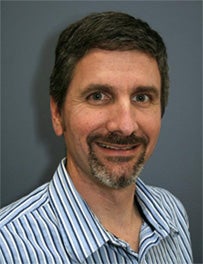Cancer investigators’ mission bolstered by three new grants
James DeGregori, Ph.D., investigator at the University of Colorado Cancer Center and professor of biochemistry and molecular genetics at the University of Colorado School of Medicine, says cancer cells “have fallback pathways.”
“You may hit them hard in one spot,” he says, “but they often find ways to eke by.”
With the help of three new grants, DeGregori hopes to add ammunition to the fight against cancer.
First is the continuation of a grant from the Leukemia and Lymphoma Society that piggybacks onto an ongoing clinical trial, run by Chris Porter, M.D., CU Cancer Center investigator and pediatric oncologist at Children’s Hospital Colorado.
Working in the DeGregori Lab, postdoctoral fellow Mark Gregory, Ph.D., discovered that a fraction of leukemia cells need something called calcineurin signaling to escape the standard drug treatment (a tyrosine kinase inhibitor).
And so Porter’s recently initiated trial will test a novel combination of drugs for the treatment of chronic myeloid leukemia.
DeGregori’s second recent grant, also from the Leukemia and Lymphoma Society, will enable DeGregori and collaborators to explore similar escape mechanisms in the leukemia cells of patients with acute myeloid leukemia. Douglas Graham, M.D., Ph.D., CU Cancer Center investigator and pediatric oncologist at Children’s Hospital Colorado, is co-investigator on this grant, and also plans to lead any clinical trial that could spring from these studies.
“We’ve uncovered some classic stress response pathways,” DeGregori says. All cells respond to damage and stress with survival strategies that might allow them to ride out a storm. But because these tyrosine kinase inhibitors stress cancer cells more than their healthy neighbors, these stress responses are more activated in cancer cells – and more important to the cancer cells’ survival.
If DeGregori and colleagues can find ways to block cancer cells’ fallback plans – these “classic stress response pathways” – cancer cells may have nowhere to run, nowhere to hide in the face of multiple targeted cancer drugs.
Last but certainly not least is DeGregori’s new RO1 grant from the National Cancer Institute, which funds the extension of a pilot project initiated with the Cancer Center’s Lung Cancer SPORE (the institutional grant for multidisciplinary research focusing on an institution’s proven area of strength).
Like leukemia, in recent years tyrosine kinase inhibitors have seemed a promising drug for the treatment of lung cancer – cut off the kinase and you strangle the cancer, goes the theory. But the cancer also can acquire new means of survival.
Discovering these cancer workarounds is the goal of his recent RO1 grant, and will require the collaborative efforts of multiple CU Cancer Center labs, including those of Paul Bunn, M.D., Aik Choon Tan, Ph.D., and Dan Chan, Ph.D.


